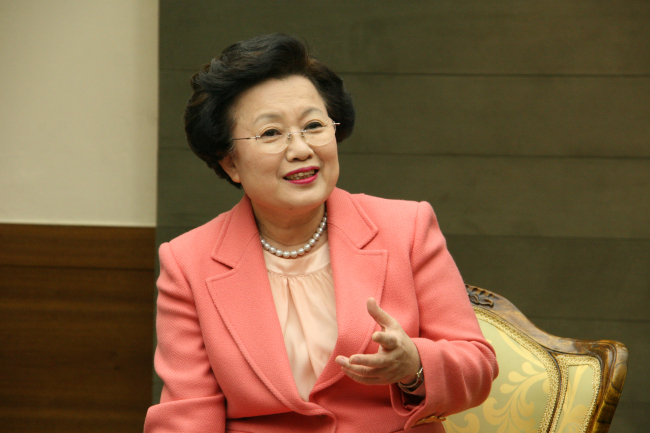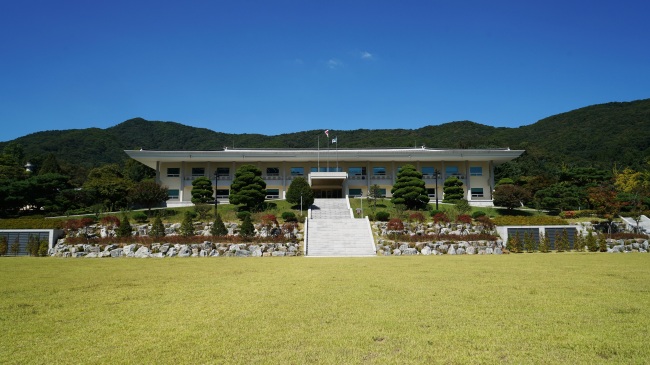‘Gain life’s wisdom from King Sejong, nature’
Historian Lee Bae-yong on history of value sharing, creativity
By 박형기Published : Oct. 30, 2015 - 16:40
Whenever people find themselves in trouble, in conflict or in depression, Lee Bae-yong, the president of the Academy of Korean Studies encourages them to look to and study history.
Lessons, cases and events from the past can boost one’s insight and help develop inner wisdom and solutions for the future, she says.
Lessons, cases and events from the past can boost one’s insight and help develop inner wisdom and solutions for the future, she says.

When Lee talks about history, she is not just talking about general Korean history.
She is specifically talking about the period of King Sejong the Great, the fourth king of the country’s Joseon era (1392-1897) and the inventor of Hangeul, the Korean alphabet.
“When people ask where and how we can find solutions in life, I usually say, ‘seek and find them from (the historical achievements of) King Sejong,’” said Lee, 68, in an interview at the academy in Bundang, Gyeonggi Province.
“His contributions during his reign teach us many things, like how to be humble and warmhearted.”
And that leads people to share and be creative, which can create value for society, she added.
The creation of Hangeul by King Sejong, for instance, illustrates how down-to-earth he was in the face of upper-class naysayers opposing the writing system for commoners when Chinese was considered the intellectual language.
The king, nevertheless, pushed forward for ordinary people -- most of whom did not know how to read and write Chinese and were unable to increase their knowledge -- because he was able to see and experience their troubles not only from his own point of view, but from their perspective.
From the history and story behind Hangeul, one can learn about modesty, creativity, sharing and companionship, said the AKS president.
“I personally define history as a ‘relay’ -- a virtuous circle of sharing and passing down,” Lee said.
“We have to know the fact that we will not be here forever. So, sharing is very important to sustain society. King Sejong created that spirit and culture, which we really need to revive in this age.”
Korea’s standard of living has improved, but its quality of life and happiness remains low, she noted.
As a historian who has studied the life and contribution of King Sejong over the years, Lee reiterated that people and society can draw inspiration from this particular moment in time.
While the creation of Hangeul helped enlighten people and increased their understanding and communication skills, the creation of maternity leave for slaves and servants further showed the king’s compassion for the people.
“He did the best he could for the people in a period when men and women were not equal. But if he thought himself as a total ruler, was he able to make a welfare policy for such people?” Lee said.
“His action tells us that he was not only very wise, but also confronted problems flexibly according to principles.”
In his 10th year as king, an incident occurred in Jinju, South Gyeongsang Province, where a father was killed by his son.
In modern society in which people still face such tragic situations, the first response would naturally be to pass stricter and harsher laws against such criminals.
King Sejong said that no law -- no matter how strong it is -- can completely root out future tragedy, insisting that the country needs to help educate people and understand the innate goodness of human nature.
This led to the creation of the ethics book “Samgang Haengsildo,” Lee explained.
“I believe that no one is born evil from the beginning. Even if someone says he or she is bad, we have to help them become good through education. We seem to have gotten lost in knowing how to do that,” she said.
This is why history provides a possible solution and answer to today’s problems as seen from how King Sejong dealt with the father-son tragedy and shared his thoughts with the pubic rather than unilaterally applying tougher rules.
Lee added that that is not the only thing the king has taught Korea.
With his contribution to agriculture, defense, economy and science and technology during his reign, King Sejong promoted the spirit of innovation, creativity and cultural uniqueness.
Because of these positive forces, Korean naval commander Yi Sun-sin saw hope in the Battle of Myeongnyang, which he won with only a dozen ships against a whole Japanese fleet.
Koreans were also able to rediscover their pride and identity even after the Japanese tried to annihilate Korean culture during the colonization era, the AKS president said.
“The young especially nowadays can learn a great deal from this part of our history, and gain the courage to move forward even after failure, which often comes before success,” Lee said.

In addition to promoting historical lessons and philosophies of King Sejong to some 130 students at the Graduate School of Korean Studies, part of the academy, Lee is seeking to register Korean seowon, the Joseon era’s educational institutions, as among the UNESCO World Heritage Sites next year.
Together with North Korea, she seeks to register Chuseok, the two Korea’s traditional Thanksgiving Day, and the reunion of families separated by the Korean War as part of the UNESCO Intangible Cultural Heritage.
Lee also suggested looking to nature for enlightenment and inspiration.
For instance, flowers bloom and die.
Lee said this offers a life’s lesson, and that is -- people have to learn to let go and let others take their place and lead for the future.
“Much like history, by looking at the trees and flowers, our nature teaches us how to share and harmonize. Trees and flowers don’t fight over space,” she said.
“We need to restrain our ambitions of always trying to be the ‘main character’ or grab the spotlight in life and society, and learn to step down or aside, and pass down for the new.”
Lee, formerly president of Ewha Womans University, was appointed head of the Academy of Korean Studies in 2013. The academy was established in the late 1970s to strengthen the study of humanities and research into Korean history and culture.
She studied history at Ewha Womans University and got her doctorate in history from Sogang University.
By Park Hyong-ki (hkp@heraldcorp.com)





![[From the Scene] Monks, Buddhists hail return of remains of Buddhas](http://res.heraldm.com/phpwas/restmb_idxmake.php?idx=644&simg=/content/image/2024/04/19/20240419050617_0.jpg&u=20240419175937)




![[Graphic News] French bulldog most popular breed in US, Maltese most popular in Korea](http://res.heraldm.com/phpwas/restmb_idxmake.php?idx=644&simg=/content/image/2024/04/18/20240418050864_0.gif&u=)



![[From the Scene] Monks, Buddhists hail return of remains of Buddhas](http://res.heraldm.com/phpwas/restmb_idxmake.php?idx=652&simg=/content/image/2024/04/19/20240419050617_0.jpg&u=20240419175937)

![[KH Explains] Hyundai's full hybrid edge to pay off amid slow transition to pure EVs](http://res.heraldm.com/phpwas/restmb_idxmake.php?idx=652&simg=/content/image/2024/04/18/20240418050645_0.jpg&u=20240419100350)

![[Today’s K-pop] Illit drops debut single remix](http://res.heraldm.com/phpwas/restmb_idxmake.php?idx=642&simg=/content/image/2024/04/19/20240419050612_0.jpg&u=)